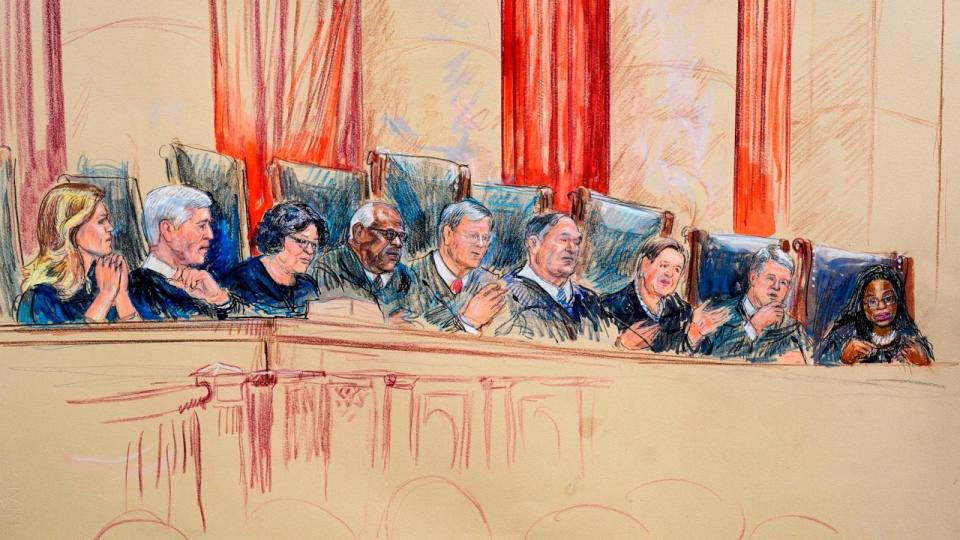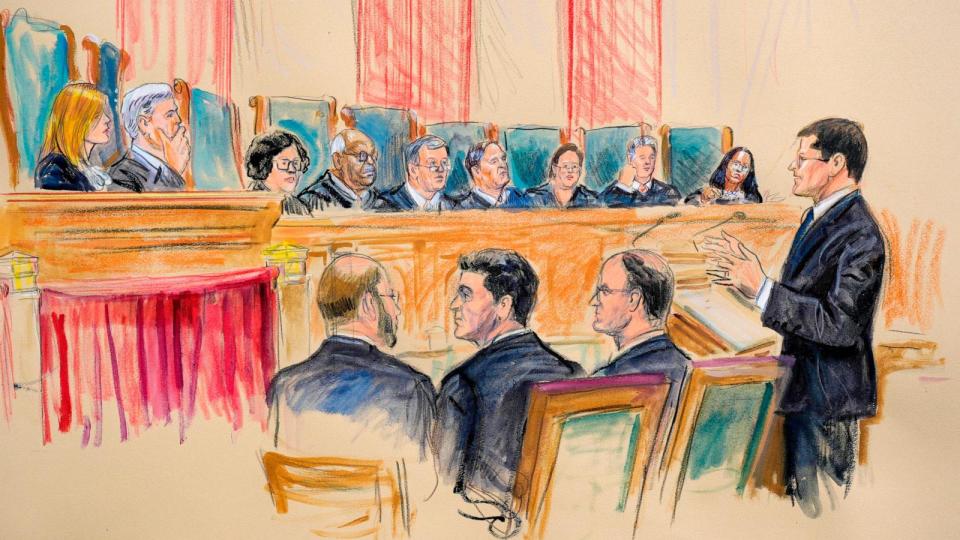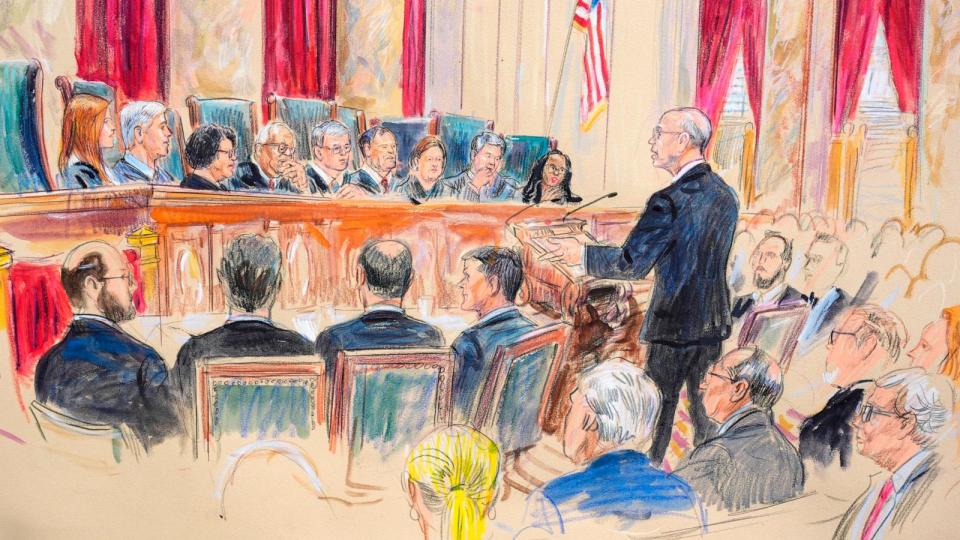In historic Trump hearing, Supreme Court majority suggests presidents may have some criminal immunity
The U.S. Supreme Court heard arguments Thursday on whether former President Donald Trump can be criminally prosecuted over his efforts to overturn his 2020 election loss.
The justices grappled with the monumental question of if — and if so, to what extent — former presidents enjoy immunity for conduct alleged to involve official acts during their time in office.
Trump claims "absolute" protection for what he claims were official acts, though he denies all wrongdoing. The high court divided over this, but most of the conservative-leaning justices in the majority seemed open to some version of it while still excluding a president's "private" conduct.
The high court's ruling will determine if Trump stands trial before the November election on four charges brought by special counsel Jack Smith, including conspiracy to defraud the United States. A decision is expected by June.
Latest Developments



Apr 25, 5:19 PM
See court sketches from inside court
The Supreme Court notably does not allow cameras inside its courtroom during arguments, meaning that sketch artists provide the only visual representation of some of the country's most defining legal moments.
Here are three sketches from the Trump arguments on Thursday — of the justices and the attorneys for each side.
Apr 25, 5:19 PM
'Quite amazing. The justices were on their game,' Trump says
Trump reacted to the arguments before the justices later on Thursday afternoon after he left court for the day amid his hush money trial in New York, to which he has pleaded not guilty.
“I think it was made clear, I hope it was made clear, that a president has to have immunity," he said, repeating a familiar talking point. "You don't have a president — or at most you could say it would be a ceremonial president. That's not what the founders had in mind.”
He continued, ”We want presidents that can get things done and bring people together. So I heard the meeting was quite amazing. Quite amazing. The justices were on their game.”
Trump did not answer shouted questions from the press.
-ABC News' Kelsey Walsh, Mike Pappano and Jianna Cousin
Apr 25, 4:23 PM
5 takeaways: Hypotheticals dominate, conservatives and liberals raise different worries and more
As various justices themselves acknowledged, they could potentially reshape the contours of presidential power when they rule on Trump's case.
Click here to read five takeaways from the historic arguments.
Apr 25, 4:23 PM
10 key moments from the arguments
The oral arguments, stretching nearly three hours and with demonstrators gathered outside, included several notable and important exchanges.
Here are 10 of the key moments — including discussion of potential self-pardons, Franklin D. Roosevelt and more.
Read more here.
Apr 25, 1:09 PM
Supreme Court's decision will directly impact when, if, Trump stands trial
How fast the justices move in making a determination will impact whether Trump stands trial before the November election — if at all.
Experts point to how the court handled Bush v. Gore, when the justices intervened to end a ballot recount and effectively hand George W. Bush the presidency in the 2000 election. In United States v. Nixon, the Watergate scandal tapes case, the Supreme Court heard arguments July 8, 1974, and issued its opinion rejecting his claim of executive privilege 16 days later.
It’s not clear whether the court will move with such speed. The opinions are expected to be released before the court’s term ends in June.
The justices could uphold the lower court decision rejecting immunity in its entirety, clearing the way for a trial this summer. Or they could kick the can down the road by sending the case back to lower courts for further proceedings — which some conservative justices floated during arguments. Such an outcome could rule out a trial before the end of the year.
Read more about timing in the case here.
Apr 25, 1:09 PM
Court adjourns
Oral arguments came to an end after two hours and 40 minutes.
Trump attorney declined to give a rebuttal, and the case was submitted.
Apr 25, 3:04 PM
'We're writing a rule for the ages'
Throughout arguments, multiple of the justices made clear they were looking past the immediate example of Trump to what their decision will mean for the future of the presidency.
"We're writing a rule for the ages," Justice Neil Gorsuch said.
"This case has huge implications for the presidency, for the future of the presidency and for the future of the country, in my view," said Justice Brett Kavanaugh.
"Whatever we decide is going to apply to all future presidents," said Justice Samuel Alito.
Apr 25, 12:25 PM
Alito suggests some sympathy toward Trump's position
Justice Samuel Alito has multiple times over the course of questioning sounded sympathetic toward Trump's positions.
He also seemed to raise concerns about former presidents suffering the burden of having to go through a trial if they are criminally charged.
"That may involve great expense, and it may take up a lot of time, and during the trial the former president may be unable to engage in other activities that the former president would want to engage in, and then the outcome is dependent on the jury, the instructions to the jury and how the jury returns a verdict, and then it has to be taken up on appeal," Alito said at one point.
In his final question to government attorney Michael Dreeben, Alito seemed to suggest that Trump's prosecution could serve to incentivize future presidents to try and unlawfully remain in office in order to avoid prosecution by their successors.
"Now, if an incumbent who loses a close, hotly contested election knows that a real possibility after leaving office is not that the president is going to be able to go off into a peaceful retirement — but that the president may be criminally prosecuted by a bitter political opponent. Will that not lead us into a cycle that destabilizes the functioning of our country as a democracy?" Alito asked.
"I think it is exactly the opposite, Justice Alito," Dreeben replied, noting Trump and his allies filed dozens of lawful challenges to the results of the election and lost.
"There is an appropriate way to challenge things through the courts with evidence," Dreeben said. "If you lose, you accept the results, that has been the nation's experience, I think the court is well familiar with that."
Apr 25, 12:16 PM
DOJ on what executive functions have 'absolute protection'
Asked by Justice Elena Kagan what "core" executive functions have "absolute protection," government attorney Michael Dreeben said they include pardon power, veto, foreign recognition and appointments.
"Congress cannot say you can't appoint a federal judge who hasn't received a certain diploma, hasn't achieved a certain age," he said.
Commander in chief is also on the list, he said, though added that Congress has "substantial authority in the national security realm."
"I think that there may be some aspects like directing troops on the field in which the president's power is completely unreviewable," he said.
Apr 25, 12:03 PM
Justices ask attorneys if presidents can pardon themselves
As the justices wrestle with immunity, they are posing another question to lawyers: Can presidents pardon themselves?
Justice Neil Gorsuch asked Trump attorney John Sauer about the possibility, saying presidents could be incentivized to do so if they fear their successors could prosecute them for actions they took while in office.
"I didn't think of that until your honor asked it," Sauer said. "That is certainly incentive that might be created."
Michael Dreeben, arguing for the government, was later asked for his view on whether the president has such authority.
"I don't believe the Department of Justice has taken a position," Dreeben said. "The only authority that I'm aware of is a member of the Office of Legal Counsel wrote on a memorandum that there is no self-pardon authority. As far as I know, the department has not addressed it further, and the court had not addressed it either."

 Yahoo News
Yahoo News 
